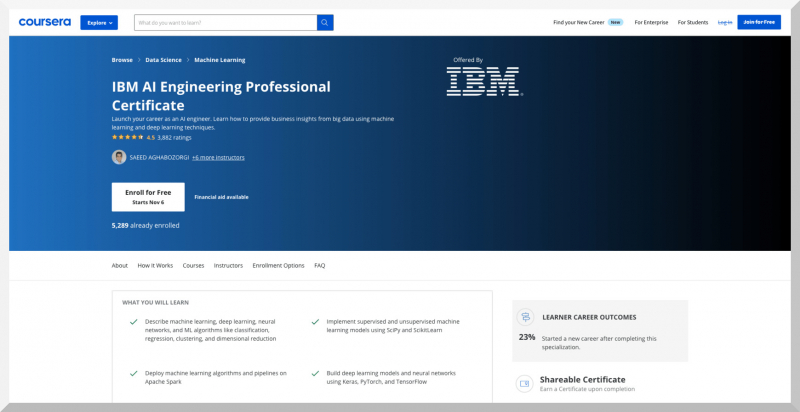IBM AI Engineering Professional Certificate – Coursera
An AI certificate course taught by industry specialists is a valuable complement to a career because it is widely regarded in the industry for learning neural network ideas in depth. This IBM certification on Coursera is an example of a course that provides students and professionals with cutting-edge AI techniques. The students will learn how to develop intelligent systems for business and other industries using various machine learning methods and deep learning neural networks. Furthermore, the students will be well-versed in the tools needed to succeed as an AI engineer in the context of organizational development.
The students will learn how to use the Python programming language to explore the concepts of supervised and unsupervised learning, as well as how to use various deep learning libraries to perform a variety of tasks such as object recognition, computer vision, image classification, text analytics, natural language processing (NLP), and building recommender systems. Learners will receive hands-on instruction to create scalable machine learning systems and will learn how to train, test, and deploy various deep learning architectures throughout the course. The learners will also receive a digital IBM badge in addition to the professional certificate, certifying their competency in AI engineering.
The course curriculum includes:
Machine Learning with Python:
- The first lesson introduces machine learning and its real-world applications, as well as a broad review of subjects like supervised and unsupervised learning, model evaluation, and various machine learning methods.
Introduction to Deep Learning and Neural Networks with Keras:
- The learners will be exposed to deep learning and how it differs from ANN models in the second module. The students will also learn about various deep learning models and implement them in order to develop their own deep learning model using Keras. Learners will understand neural networks, deep learning models, unsupervised deep learning models such as autoencoders, and limited Boltzmann machines at the end of this session. In addition, students will get an understanding of convolutional neural networks (CNN) and recurrent networks, as well as actual experience building neural networks for real-world situations.
Introduction to Computer Vision and Image Processing
- This lesson explains image processing, picture categorization, and object identification, as well as AI applications including self-driving cars, robotics, and augmented reality. For better classification performance, the students will learn to create, train, and test bespoke pictures and classifiers with detection models.
Deep Neural Networks with PyTorch
- The fourth module teaches you how to use Python to create deep learning models. The students will obtain a thorough understanding of various Python modules and packages for developing AI models. The principles of linear regression, logistic regression, softmax, and feedforward deep neural networks will also be covered. The learners will also investigate the activation function, normalization, and dropout layers in a neural network, as well as their applications. Finally, the students will learn about CNN and how to use transfer learning to solve a specific problem.
Building Deep Learning Models with TensorFlow
- Learners will explore advanced principles in deep learning model development with TensorFlow in this module. Unlabeled and unstructured data, shallow neural networks, and their applications are all thoroughly discussed. Also covered are TensorFlow concepts such as primary functions, operations, and execution pipelines, as well as model-building stages.
- In addition, real implementations of the concepts of regression, classification, curve fitting, and minimizing error functions with TensorFlow models are addressed.
- Finally, the students will understand several deep learning architectures, how to use TensorFlow for backpropagation, and how to tune weights and biases for the neural networks they are training.
AI Capstone Project with Deep Learning
- The final capstone is required for certification and the IBM digital badge. The projects will be based on real-world difficulties, and students will be required to create a deep learning model from scratch. Finally, in order for the project to be approved, the students must demonstrate the validity of their model.
Instructor: Saeed Adghabozorgi, Alex Aklson, Samaya Madhavan, Romeo Kienzler, Joseph Santarcangelo, Aije Egwaikhide, and Jeremy Nilmeier
Level: Intermediate
Duration: 9 months
User Review: 4.5/5
No. of Reviews: 3870
Price: Free Enrollment (Additional charges for certification may apply)
Website: coursera.org/professional-certificates/ai-engineer











